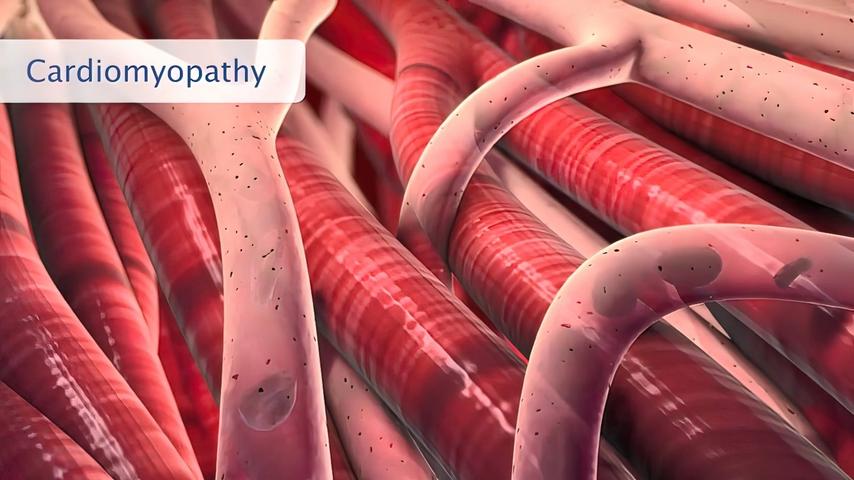What is Cardiomyopathy: Causes, Symptoms & Treatment

What is Cardiomyopathy?
Cardiomyopathy is a disease of the heart muscle. It occurs when the heart muscles weaken, due to which the heart is unable to pump blood to the body. Cardiomyopathy is of four different types and is caused due to several factors. Timely diagnosis and treatment can help prevent complications arising from this condition, including heart failure.
What are the types of Cardiomyopathy?
The four types of cardiomyopathy are:
- Dilated Cardiomyopathy:
The meaning of dilated cardiomyopathy is the enlargement of the heart muscle, which renders it too weak to pump blood efficiently. It can be an inherited condition or a result of coronary artery disease.
Dilated cardiomyopathy treatment includes medications to control the heart's rhythm and help it pump blood better, lower blood pressure, and prevent blood clots.
- Hypertrophic Obstructive Cardiomyopathy:
The meaning of Hypertrophic cardiomyopathy is the thickening of heart walls which prevents blood from flowing through the heart. It leads to stiffness of the heart muscles, which increases the risk of electrical problems.
Hypertrophic cardiomyopathy treatment includes medications that slow the heart rate and help the heart pump blood efficiently.
- Arrhythmogenic right ventricular dysplasia (ARVD):
It is a disease in the heart muscle that causes irregular heart rhythms. It also causes abnormalities in the functioning of the right ventricle.
- Restrictive Cardiomyopathy
In this type, the heart muscle stiffens and doesn't expand to fill up with blood in between heartbeats.
What causes Cardiomyopathy?
Cardiomyopathy causes are:
- Chronic high blood pressure
- Rapid heart rate
- Problems in the heart valve
- Damage to heart tissue from a heart attack
- Inflammation of the heart
- Obesity
- Diabetes
- Thyroid
- Covid-19 infection
- Vitamin deficiency
- Iron buildup in the heart muscles
- Protein buildup
- Connective tissue disorder
- Complications during pregnancy
- Alcoholism
- Drug usage
- Chemotherapy and radiation therapy
What are the symptoms of Cardiomyopathy?
Symptoms of cardiomyopathy are:
- Fatigue
- Breathlessness
- Dizziness, fainting
- Chest pain
- Heart palpitations
- High blood pressure
- Oedema in the feet, ankles, legs, or other areas
- Bloated stomach
- Cough when lying down
What are the risk factors of Cardiomyopathy?
The following factors increase the risk of cardiomyopathy:
- Chronic high blood pressure
- Heart conditions, such as coronary artery disease, infection in the heart
- Past heart attacks
- Obesity
- Alcoholism
- Illicit drug use
- Treatment with chemotherapy and radiation therapy
- Family history of cardiomyopathy, sudden cardiac arrest, and heart failure
Diseases that put you at risk of cardiomyopathy are:
- Thyroid
- Diabetes
- Amyloidosis, or protein buildup in the organs
- Sarcoidosis, or the growth of tiny inflammation cells in several parts of the body
- Hemochromatosis, or excess iron storage in the body
- Connective tissue disorders
How is Cardiomyopathy diagnosed?
Doctors enquire about the medical history before performing a physical examination. Tests used to confirm cardiomyopathy are:
- Chest X-ray:
This helps the doctor check for enlargement of the heart.
- Echocardiogram:
An echocardiogram helps check the heart valve. Sound waves create images of the heart to show its size and movements as it beats.
- Electrocardiogram:
This non-invasive test checks the heart's electrical activity over a short period.
- Stress test:
This test helps assess the heart's functioning and rhythm, blood pressure, and breathing while you exercise.
- CT Scan:
A cardiac CT scan collects images of the heart to check the heart size, its functions, and the heart valves.
- Heart MRI:
An MRI uses magnets and radio waves to collect images of the heart and its blood vessels.
- Blood tests:
Doctors order blood tests to check the kidneys, liver, and thyroid. Blood tests also measure the level of BNP or B-type natriuretic peptide. It is a protein produced in the heart, the blood level of which might rise during heart failure.
Besides these diagnostic tests, doctors also advise some procedures to confirm cardiomyopathy. These are:
- Cardiac catheterization:
In this procedure, a thin, long tube is inserted into the groin and threaded through the coronary arteries to the heart. This procedure helps check for heart blockages and to see how forcefully the blood pumps through the heart.
- Coronary angiography:
In this procedure, a dye is injected into the bloodstream to check for blood flow through the arteries and the heart.
- Myocardial biopsy:
In this procedure, doctors remove a small part of your heart's tissue to examine it under a microscope.
How is Cardiomyopathy treated?
Cardiomyopathy treatment depends upon the damage to the heart because of the condition. Treatment includes:
- Medication:
Doctors prescribe medicines to improve the heart's ability to pump blood and increase blood flow, bring down blood pressure and heart rate, prevent blood clots, and remove any extra fluid from the body.
- Implant devices:
Devices, such as pacemakers and defibrillators, are inserted surgically.
- Surgery:
Bypass surgery or valve surgery is advised if medications don't show results. Septal myectomy is performed to remove some heart tissue for better blood flow to the heart.
- Lifestyle changes:
Doctors advise regular physical activity, a heart-healthy diet, quitting smoking, managing stress, and weight reduction.
- Heart transplant:
A heart transplant is the last resort, especially for people with heart failure or for whom medications do not help.
How can you prevent Cardiomyopathy?
To ensure you don't develop any heart conditions that increase your risk of cardiomyopathy, you must make the following lifestyle changes:
- Follow a heart-healthy diet:
Include fruits, vegetables, whole grains, nuts, seeds, and low-fat dairy. Avoid fried, sugary, and fatty foods and reduce salt intake.
- Adopt a fitness regimen:
Get at least 30 minutes of exercise six days a week.
- Get enough sleep:
Sleep deprivation and heart disease are interlinked, so ensure you get 7 to 8 hours of uninterrupted sleep.
- Manage stress:
Try healthy ways of reducing stress by doing deep breathing exercises, meditation, or yoga.
- Quit smoking:
Smoking affects your cardiovascular health, so quitting is the best solution.
- Manage your health conditions:
Diabetes, cholesterol, or thyroid are the underlying health conditions that increase the risk of cardiomyopathy. Consult your doctor and learn to manage these with medications and healthy lifestyle changes.
Gleneagles Aware Hospital in LB Nagar, Hyderabad, offers expert care and surgical procedures in Cardiac Sciences. Our highly skilled team of cardiac specialists in Hyderabad will guide you on the treatment for cardiomyopathy and preventive measures for a healthy heart.
We conduct advanced heart failure management at our cardiac failure clinics. We successfully conduct procedures, like CRT, CRTD, ICD, and L-VAD at Gleneagles Aware Hospital using the most advanced technology best suited to our patients.
Book an appointment with our specialists at Gleneagles Aware Hospital, today!
FAQs:
Who is at a higher risk of cardiomyopathy?
People with diabetes, high blood pressure, obesity, high cholesterol, unhealthy dietary habits, sedentary lifestyle, and smoking habits are at a higher risk of developing the condition.
Can cardiomyopathy be cured?
Although there is no cure for cardiomyopathy, one can make healthy lifestyle choices and seek timely medical attention to improve their quality of life.
What are the signs of cardiomyopathy getting worse?
The signs of cardiomyopathy getting worse are:
- breathlessness when doing an activity and also when at rest
- swelling in the feet, ankles, and legs
- coughing when lying down
- bloating in the stomach from fluid buildup
- rapid heartbeat
- chest discomfort
- exhaustion
Specialities
Clear allMeet the doctor

Dr Mukhesh Rao
Cardiology
M.B.B.S, M.D (Internal Medicine), D.M (Cardiology)











